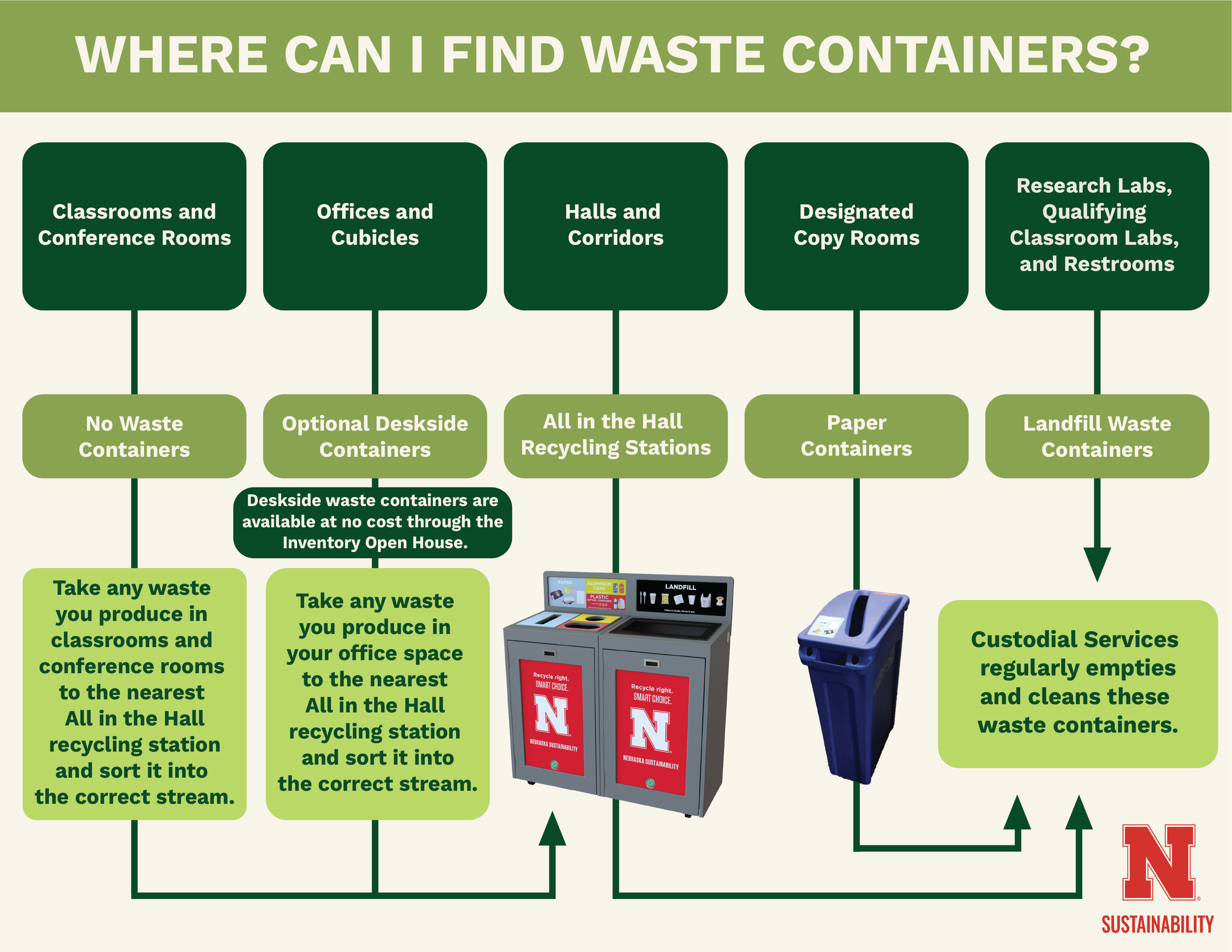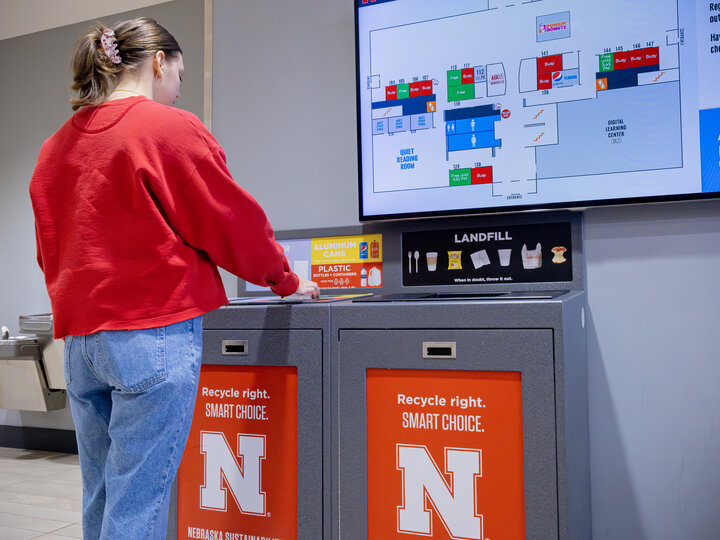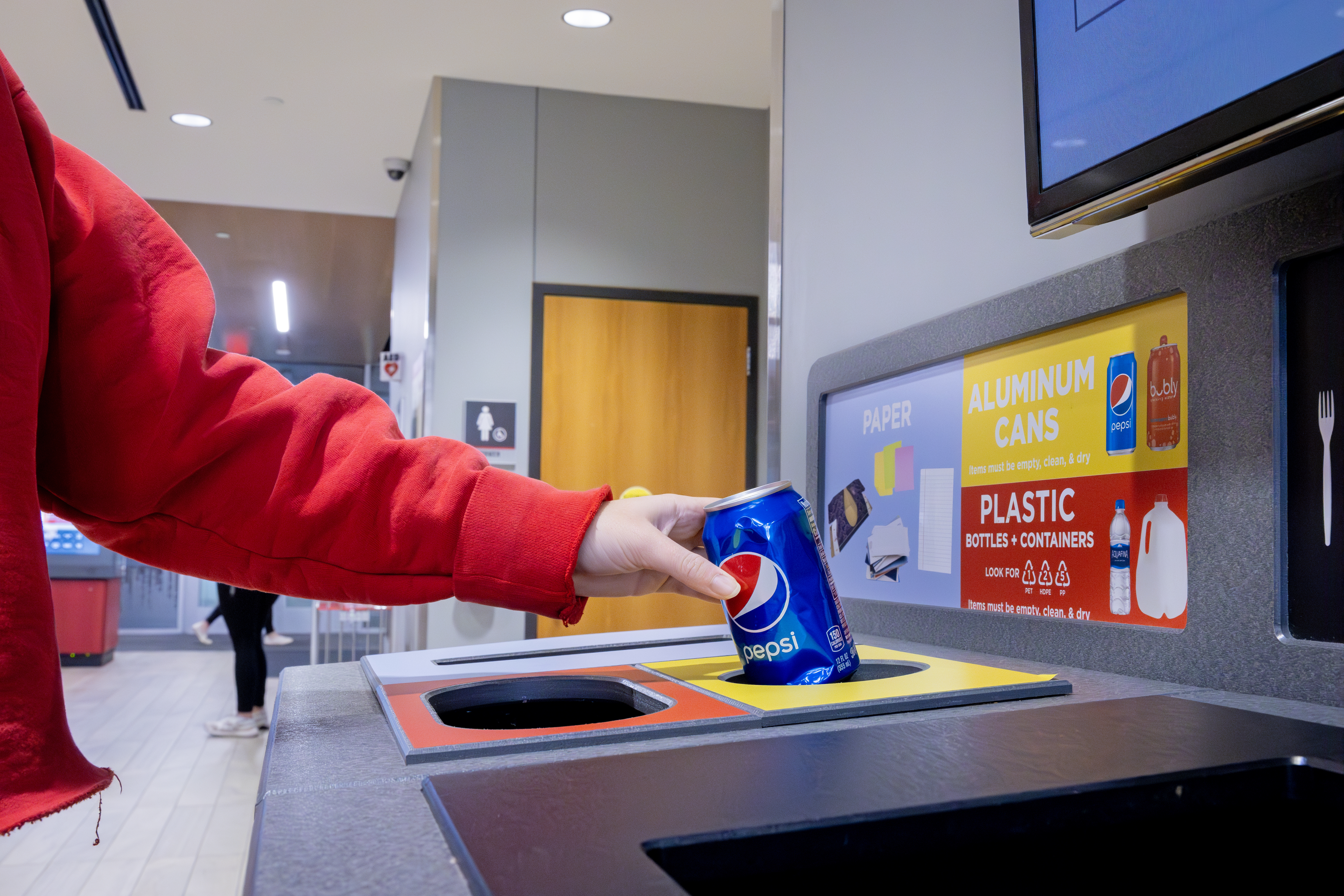About
The University of Nebraska-Lincoln adopted the All in the Hall recycling standard based on the success of the Recycling Pilot Project, which was implemented in eight campus buildings in December 2020. The All in the Hall program was approved by UNL’s Chancellor and Executive Leadership Team for campus-wide implementation to make progress toward institutional sustainability goals. Implementation of the program occurred in phases, with an initial focus on high-traffic, academic-use spaces.
-
2019
Results of a UNL Office of Sustainability survey show that 93% of respondents identified better recycling opportunities and education as a top priority.
-
2020-2021
Waste audits of campus buildings reveal that an average of 18% of the materials deposited in the landfill waste stream could instead be recycled.
In response to these findings, a recycling pilot project that later becomes the All in the Hall recycling program is implemented in 8 mixed-use buildings on campus.
-
2022-2023
The Recycling Pilot proves successful through a 10% decrease in the average amount of recyclable materials found in the landfill stream, leading to the All in the Hall recycling program being approved by the Executive Leadership team as UNL's standardized recycling program. All in the Hall is implemented through phases in 56 buildings across City and East Campuses. Included in this implementation is a pilot of the All in the Hall program in Robert E. Knoll Residential Center, Eastside Suites, and University Suites. This pilot serves as a learning experience to evaluate future implementation in other residence halls and is the result of collaboration between University Housing and the Office of Sustainability.
-
2024 & Beyond
All in the Hall is implemented in 34 additional buildings in 2024, and 17 in 2025, bringing the total to 107 buildings. The All in the Hall recycling program is now active in nearly all campus buildings used primarily for instruction, research, and engagement. The 2025 implementation also brought All in the Hall to the Nebraska Union, residence halls, Memorial Stadium, the Devaney Center, and the Lied Center for Performing Arts.
Did You Know?
UNL is closing the loop by using recycling stations that are made of 97% recycled plastic!
Recycling Guides:
Download and review the process visualization to learn more about the process for handling your waste as part of the All in the Hall standard.
Frequently Asked Questions
Recycling Guidelines
Why do I need to sort my recyclables?
UNL practices multi-stream recycling, meaning there are multiple recycling streams: Cardboard, Paper, Aluminum Cans, and Plastic Bottles and Containers. It is necessary for recyclable materials to be separated appropriately, because the different material types are transported separately to avoid contamination. This ensures that each commodity stays as clean as possible during the transport process, making it easier for the material recovery facility (recycling processing center) to accept and process the materials. Recyclables with high rates of contamination from food or other non-recyclable items cannot be recycled and are typically sent to the landfill. Learn more about how to correctly sort your recyclables by reviewing the UNL Recycling Guide.
Can I recycle books at UNL? Coffee cups? Glass? Air pockets from packages and plastic bags? Ink and toner cartridges?
- Books: Paperback books can be recycled with office paper in the Paper recycling stream. If you have a large quantity of hardcover books to be recycled, please email sustainability@unl.edu to coordinate a special pickup. Consider donating books to give them a second life rather than disposing of them.
- Coffee cups: Unfortunately, paper coffee cups are not recyclable. These cups contain an internal plastic or wax coating to provide insulation and waterproofing, making them unrecyclable. Please dispose of your cup in the trash, or better yet, bring a reusable mug to be filled up at your favorite shop! Most coffee shops on campus and around Lincoln offer a cup discount - save money and make a difference by prioritizing reusables.
- Glass: Glass is not currently collected for recycling at UNL. The City of Lincoln accepts clean and dry glass bottles and jars at Consumer Recyclables Collection Sites.
- Air pockets, plastic bags, and other plastic films: Air pockets, bubble wrap, and plastic grocery bags are considered plastic films. Plastic films are not able to be recycled with UNL’s Plastic Bottles and Containers recycling stream because they create a hazard for recycling processors. These items can cause recycling sorting machines to malfunction, shut down, or even catch fire! On campus, these items should be disposed of in the landfill stream. However, these items can be recycled via drop-off at specialized collection sites at many large grocery and other retail stores.
- Empty ink and toner cartridges: Empty ink and toner cartridges can be packaged and returned to Mail Services with regular campus mail. The ink and toner cartridges received from campus are shipped to Environmental Office Solutions in Colorado. Cartridges are then sorted based on condition and end-market requirements and ultimately sold to cartridge fillers for refill and reuse.
My office is getting new furniture, electronics, etc. Does UNL reuse surplus property?
Yes! Inventory, Moving, and Asset Management provides the UNL community with direction and guidance regarding fixed asset acquisition, transfer, and reuse of surplus property on campus. UNL campus departments have the opportunity to purchase items for departmental use at a reduced cost from UNL's Marketplace. Inventory auctions open to the public are also held periodically. Visit the Inventory, Moving, and Asset Management website to learn more.
What do I do with cardboard?
Please flatten corrugated cardboard boxes and place them behind an All in the Hall recycling station or take them directly to the nearest cardboard dumpster located on the building dock or in an outdoor dumpster area. Paperboard items, such as tissue boxes should be placed in the Paper recycling stream.
Can pizza boxes be recycled?
Pizza boxes can be recycled, but only if the cardboard is clean, dry, and does not have any solid food residue. Pizza boxes must be free of contaminants including solid food residue (leftover pizza) and other waste items including pizza savers, wax paper, sauce containers, etc. Small grease stains are okay. If your pizza boxes meet these criteria, please flatten your boxes and place them behind an All in the Hall recycling station or take them directly to the nearest cardboard dumpster. If boxes are contaminated and not acceptable for recycling, they should be disposed of with landfill waste.
How do I dispose of wooden pallets?
Pallets are picked up from most buildings on a weekly basis and can be left near your building's dumpsters. If you have a special request, please contact the Facilities Service Desk at 402-472-1550 or servicedesk@unl.edu.
Does UNL provide shredding services?
Print and Mail Services runs a shredding program on campus to support shredding needs. Visit the Print and Mail Services website for more information.
I have something that I think may be considered a hazardous material - can I put this in a landfill container?
Do not dispose of hazardous waste in a landfill container. Environmental Health and Safety provides guidance on safe disposal for all hazardous materials - including batteries, lightbulbs, electronics, and more. Contact EHS at 402-472-4925 or ehs@unl.edu for information.
How do I request temporary containers to clean out an office or storage space?
Please email the Facilities Service Desk at servicedesk@unl.edu with your request. Requests will be routed to Refuse and Diversion Services to deliver the appropriate containers. Please note that containers will be delivered to the requested building dock and must be returned by the requestor to the dock to be emptied.
I’m having an event where food will be served. Should I request additional waste containers?
Yes. Custodial Services can provide larger waste receptacles for use during events, especially where food will be served, or larger amounts of waste are expected to be produced. Please contact the Facilities Service Desk at servicedesk@unl.edu to request containers.
All in the Hall Recycling Program
Why is having a standardized recycling program at UNL important?
Prior to the Recycling Pilot Project, recycling processes functioned differently in each building, which often led to confusion about what and how to recycle on campus and placed the responsibility of coordinating building-level recycling on individuals. Results of the Office of Sustainability’s 2019 Sustainability Culture, Literacy, and Transportation survey indicated that over 93% of faculty, staff, and student respondents viewed recycling as a priority on campus. The All in the Hall program, which is based on the success of the Recycling Pilot Project, is designed to make recycling easier and more efficient at UNL, provide better education for the campus community, and help achieve the university-wide sustainability goal of becoming a zero-waste campus, as outlined in UNL’s 2020 Environment, Sustainability, and Resilience Master Plan. Through the All in the Hall program, it is expected that the amount of materials correctly recycled at UNL will increase and the amount of materials sent to the landfill will decrease. Pre-pilot waste audits in each of the pilot buildings revealed that an average of 18% of materials found in the landfill stream could be recycled instead. Since implementation of the pilot project, this has decreased to 8%! Empowering the UNL community to monitor and sort their waste items often leads to more mindful consumption and disposal behaviors, reducing contamination and improving recycling rates.
How do I participate in All in the Hall?
As part of the All in the Hall recycling program, all members of the UNL community are expected to be mindful of the waste they individually produce on campus, transport items to the All in the Hall recycling stations, and sort them into the correct stream. As a member of the UNL community, you can make a difference by being mindful of the waste you produce. Do your part to help UNL reduce waste, reduce contamination in recycling streams, and divert waste from the landfill!
How do I properly recycle in my residence hall?
All in the Hall was fully implemented in all of UNL's residence halls in summer 2025. Find a helpful visual guide showing how to recycle in your residence hall below.
Where are waste containers located in campus buildings?
- Classrooms and conference rooms do not have any waste containers. Take any waste you produce in these areas to the nearest All in the Hall recycling station and sort it into the correct stream.
- Offices and cubicles can have optional deskside containers, but they are not maintained by Custodial Services. Any containers in these areas are the occupant’s responsibility to maintain, including transporting waste for sorting and disposal at an All in the Hall recycling station.
- Halls and corridors have All in the Hall recycling stations to collect Cardboard, Mixed Paper, Plastic Bottles and Containers, Aluminum Cans, and Landfill Waste. These recycling stations are regularly serviced by Custodial Services.
- Copy rooms may have paper recycling “Slim Jim” containers with graphics that coordinate with the All in the Hall program. These containers are regularly serviced by Custodial Services.
- Research labs and qualifying classroom labs have landfill waste containers that are regularly serviced by Custodial Services.
- Restrooms have landfill waste containers that are regularly serviced by Custodial Services.
Please refer to the below graphic for an overview of waste container locations.

Can I keep my office trash can? Can I request a different container for personal deskside use?
- Deskside waste containers are not removed from private office spaces during the implementation of All in the Hall (unless otherwise requested), but they are not serviced by Custodial Services. If you choose to keep your deskside landfill or recycling container, it is your responsibility to transport its contents to an All in the Hall recycling station and sort items for disposal.
- If you’re looking for a different waste container for personal deskside use, there are a variety of containers available at no cost to UNL departments at the Inventory Open House on East Campus. These gently used containers are available in multiple colors and sizes. If you have any questions about procuring a deskside waste container, please call 402.472.4942 or email unl_inventory@unl.edu.
Does Custodial Services provide plastic liners for my trash can?
Custodial Services does not provide plastic liners for personal deskside waste containers. If you choose to keep any deskside waste containers in your personal workspace, it is your responsibility to maintain them.
Does Custodial Services still clean my office?
Office cleaning services are not affected by the All in the Hall program, but Custodial Services does not provide weekly service of deskside trash cans.
What do I do if the nearest All in the Hall recycling station is full?
Custodial Services staff closely monitor recycling stations to ensure that they are regularly emptied. If a recycling station is full, please contact the Facilities Service Desk by calling (402) 472-1550.
General Recycling
Why should I recycle?
Recycling is an easy way for you to make a difference, saving valuable space in landfills and conserving natural resources. To Recycle Right, it is important that you only put items into the recycling stream that you are confident can be recycled. Please refer to UNL’s Recycling Guide and the graphics on the All in the Hall recycling stations for guidance on what can be recycled on campus. Recyclables that are contaminated with food waste, plastic bags, and non-recyclable materials are often sent to the landfill, which wastes valuable resources like time and money. When in doubt, throw it out!
What happens to the recyclables picked up from UNL buildings?
Refuse and Diversion Services is a department of UNL that manages UNL’s internal waste hauling operation. Refuse and Recycling Material Collectors operate packer trucks to collect waste from buildings. Recyclables are transported to a local material recovery facility (recycling processing center), where materials are weighed, separated by commodity and grade, and baled to be shipped to companies that make them into new products. Learn more by checking out the Journey of Waste at UNL infographic.
Can I bring my recyclables from home to recycle on campus?
UNL does not have the capacity to accept recyclable materials produced by faculty, staff, and students off campus. Please only use UNL recycling services for waste generated on campus.
Where can I recycle in Lincoln?
The City of Lincoln Solid Waste Management Division operates Residential Consumer Recyclables Collection Sites throughout Lincoln for household use. Additionally, all garbage collectors operating within the city offer recycling as a curbside pickup service. Visit the City of Lincoln website to learn more.
Why doesn’t UNL compost organic waste?
It is not economically feasible for the university to offer campus-wide composting at this time. Dining Services has installed biodigesters in campus dining centers to divert food waste from the landfill. Biodigesters use enzymes to break down food, producing environmentally safe grey water that is cycled back into Lincoln wastewater treatment facilities. Watch this short video to learn more.
Media About All in the Hall
Read about All in the Hall in Nebraska Today
